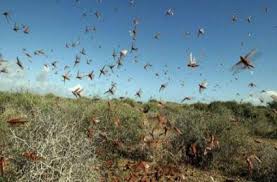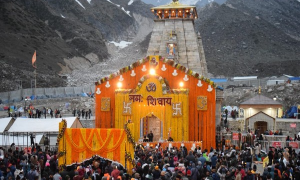After receiving reports of locust invasion in parts of Haryana on Friday, Punjab’s agriculture department is also keeping a look out for the short-horned grasshoppers that leave a trail of destruction in their wake.
Top officials at the Locust Warning Organisation (LWO), a subsidiary of the central ministry, have said that there are no signs of such an infestation in Punjab, but officials say it is tough to trace the exact movement of the swarms during monsoon and thus it is best to stay alert.
South Malwa districts such as Fazilka, Muktsar and Bathinda, which share the boundary with Rajasthan and Haryana, are believed to be most vulnerable.
Farmers in the region are in a tizzy as cotton has been sown and paddy sowing is also in full swing. State agriculture director Sutantar Kumar Airi said locust invasion in Punjab could potentially affect the crops.
“We are ready for any emergency situation caused by locust swarms. Special monitoring teams are working in different districts in coordination with central agencies and adjoining states,” he said.
Fazilka chief agriculture officer Manjit Singh said tractor-mounted sprayers, fire engines and manpower were on standby. They will be used to spray insecticide on the migratory pests.
“We are keeping a close watch on the locusts. Early this week, swarms were reported in Gharsana in Rajasthan’s Sri Ganganagar, about 250km from Abohar town in Fazilka, a vulnerable region, but they did not enter the district,” said the official.
LWO deputy director and national coordinator on mitigating locust attacks KL Gurjar said locusts move according to wind direction and during the monsoon wind directions change frequently.
“After entering parts of Mahendragarh and Rewari on Friday, this morning swarms were seen flying towards Palwal and Gurugram. Swarms of locust can cover a distance of 150 km a day and if the wind direction does not change, they may hit Uttar Pradesh soon. So far, Punjab is not under threat but the state has been asked to stay fully prepared,” said Gurjar.
“The prevalent climatic conditions are worrying as locusts breed when the weather is humid,” he said.
“Locusts are expected to return to Rajasthan to mature and lay eggs. The desert locusts normally live and breed in semi-arid regions. So far, we have been able to contain the insect invasion significantly,” said Gurjar.




























 WhatsApp us
WhatsApp us
Pingback: https://www.postandcourier.com/sponsored/phenq-reviews-does-this-diet-pill-actually-work/article_1cdbfb1a-395f-11ee-9d97-33c51303c959.html
Pingback: modesta
Pingback: buying psilocybin mushrooms online